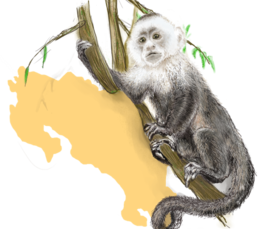Plasticity and Adaptation of Capuchin Monkeys examined through Behaviour, Microbes and Genes
Rado Seminar by Amanda Melin
- Date: Jul 1, 2022
- Time: 10:30 AM - 11:30 AM (Local Time Germany)
- Speaker: Amanda Melin
- University of Calgary
- Location: Hybrid meeting
- Room: Seminar room MPI-AB Bücklestrasse + Online
- Host: Max Planck Institute of Animal Behavior

Adaptation to changing environments shapes the genetic and phenotypic diversity of organisms over evolutionary time. Animals also face changing environments throughout the course of their lifetime, and plasticity in behaviours, gene expression, and microbes helps them survive these short-term shifts. In my talk, I discuss adaptation and plasticity in a highly flexible, social primate, the capuchin monkey. I introduce several of our collaborative field and lab studies, which integrate 40 years of behavioural and demographic study of white-faced capuchins (Cebus imitator) in Sector Santa Rosa, Costa Rica, with recent genomics analyses of capuchins and their gut microbiomes. This includes analysis across seasons, years, populations, and in comparative context with other mammalian species. By using different approaches and tools that span behavioural ecology, demography, and the ‘omics of hosts and their commensal organisms, we can better understand how adaptation and plasticity have shaped the form and function of our close relatives, and generate new insight into the forces shaping our own evolutionary history and present-day variation.